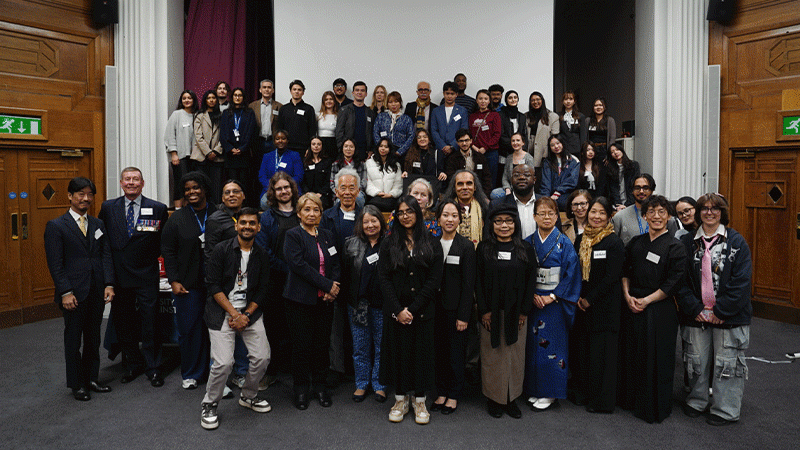Students from the Democratic Education Network (DEN) at the University of Westminster hosted a symposium to commemorate Victory over Japan (VJ) Day, which took place on 15 August to mark the 80th anniversary of the end of the Second World War.

The symposium was organised by Psychology Lecturer Dr Kyoko Murakami and Director of the DEN Dr Farhang Morady, and was supported by Chi-Wang Edgar Lee and the wider Equality, Diversity and Inclusion (EDI) team. The event reflected on the war's legacy and promoted sustainable peace through dialogue and cultural exchange.
The programme featured a diverse range of speakers from the UK and Japan, fostering a sense of community and engagement among students, academics, activists and practitioners of reconciliation and peace building.
The symposium began with an opening address from Professor Peter Bonfield, Vice-Chancellor and President of the University, and Professor Dibyesh Anand, Deputy Vice Chancellor of Global Engagement and Employability, who emphasised the importance of remembering the war from various perspectives and learning from those with firsthand experience.

The first part of the symposium focused on cross-disciplinary perspectives on the war in the Far East and saw talks from Kotaro Katsuki, Minister and Head of the Political Section at the Embassy of Japan in the UK, and BBC award-winning journalist Fergal Keane OBE, who spoke about his experiences working in war-torn countries.
Akiko Macdonald, Chairperson of the Burma Campaign Society, followed and discussed the aftermath of the war and the experiences of the Burmese veterans, including her father, who fought against the British. Dr Elizabeth Chappell from the Open University then presented narratives of hibakusha - atomic bomb survivors - and Kazumi Kuwahara, a third-generation hibakusha, shared personal stories from her grandmother, providing an insight into her family’s experience.
The morning session concluded with a Q&A session chaired by DEN students Afra, Charlene and Maliha, and a traditional Japanese music performance was hosted by koto player Sakie Plunkett.

The second part of the symposium was chaired by DEN students Michelle, Layla and Ediie and featured a dialogue amongst activists, filmmakers, British war veterans, spiritual leaders, students and academics. The dialogue covered peacebuilding, reconciliation and the role of cultural exchange in fostering understanding, and panellists had the chance to share their own personal stories with the audience.
The day came to a close with a final address from DEN students Lucrezia and Renate, and a presentation titled What is and Why Tea Ceremony? by Dr Murakami, which was inspired by the philosophy of tea as a tool for peace-making. As part of the presentation, attendees listened to a recorded interview with Sen Soshitsu, the 15th-generation Urasenke Grand Master, and were invited to the tea ceremony, Chado, discovering the peacefulness that can be found in a bowl of tea.
Dr Morady said: “Victory is not merely the end of conflict, but the beginning of understanding. Through dialogue and collaboration, students don’t just study the world - they begin to shape it. At the DEN, we empower students to turn historical memory into a force for peace and global responsibility. Through its involvement, the DEN transformed the symposium into a dynamic educational experience that embodied its dual mission of collaborative learning and international solidarity. Through student publications, global partnerships and reflective learning opportunities in the DEN's broader programme, the organisation will maintain its impact.”
Afra Bhuiyan, second-year Politics and International Relations BA Honours student, added: “I was honoured to chair a section of the event, which deeply impacted me and sharpened my communication, public speaking and event coordination skills. I also had the privilege of supporting a traditional Japanese tea ceremony, where I gained a deep appreciation for the discipline, mindfulness and cultural significance behind each movement - a humbling and enriching experience.”
Student Renata Pernegrova added: “Together with my fellow peers from the DEN, I partnered with Dr Murakami and Dr Morady to organise the event and had the honour to give closing remarks. I am very grateful for the opportunity to organise this immensely insightful event, which enhanced my teamworking and leadership skills. More importantly, it made me think about human suffering, reconciliation and memories we carry through generations.”
Professor Dibyesh Anand added: “As Professor Bonfield reminded us during his welcome remarks, our commitment to the Sustainable Development Goals (SDGs), including the one about peace and justice, encourages us to do these events. While all the speakers were informative, especially powerful was the testimony of Kazumi Kuwahara. The role of the DEN students in chairing and running the event was amazing. Thank you, Dr Murakami and others.”
The symposium directly contributes to the United Nations Sustainable Development Goals (SDGs) 4: Quality Education, 16: Peace, Justice and Strong Institutions and 17: Partnerships for the Goals. Since 2019, the University of Westminster has used the SDGs holistically to frame strategic decisions to help students and colleagues fulfil their potential and contribute to a more sustainable, equitable and healthier society.
Learn more about the Democratic Education Network and how it supports global citizenship at Westminster.









